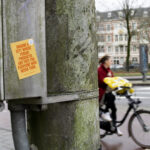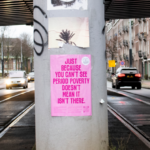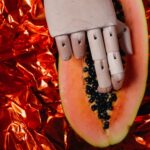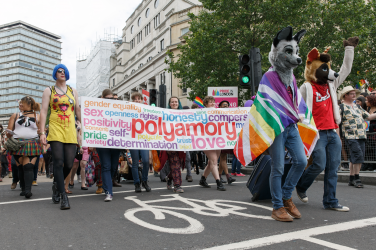It is a fact that period products are expensive and therefore not accessible to everyone who needs them. Periodic, an organization made up of students and young professionals in the Netherlands, aims to change that. E&M-Author Antonia Frank spoke to one of Periodic’s founders Emma Hoch about period poverty and stigma, activist and legal solutions, and her personal experiences with student activism and Periodic. Originally from Germany, Emma is in the third year of her bachelor in Politics, Psychology, Law and Economics (PPLE) at the University of Amsterdam. She is passionate about changing the world through entrepreneurship, which is also what led her to Periodic.
AF: Can you tell me about Periodic as an organization, how is it structured at the moment and what are the roles of the different members?
EH: We are a core team of eight people. And as we are all doing this voluntarily, we are very, very flexible in the roles, though we do have some specializations. For example, we have someone who is taking accounting matters into her hands, we have people focusing more on social media interviews or the website, others more focused on talking to politicians and being connected to the Dutch sphere.
There is the aspect that a lot of us are internationals, which can have a weird connotation of why all these internationals are founding this organization in the Netherlands. So, we are very aware that we need to have Dutch ties, and obviously, there are Dutch people in our organization as well.
Then there are also people like me, who are focusing on awareness and building up the MenstruWeek again and doing campaign planning. So, when we see something like the municipality meeting now, it means thinking about how does our social media strategy look then for the next four weeks? How can we make sure the most people pay attention to this and that the municipality makes the changes that we want them to make?
But it’s really not rigid at all. It’s really just whoever has time, whatever comes up, just see that we can implement it quickly. And hopefully, we get a cool outcome.
AF: And is everyone a student?
EH: We are six students and two young professionals, who are also almost 10 years older. In that way we are covering the target group in age. And we’re all females, we have to say that too. But we have a lot of amazing male supporters, for example as advisors. There’s some little things that you just have to be aware of, like the international aspect and the all-female aspect because you pretty quickly can get stigmatized.
We’re advocating for a root cause, so it’s a lot of putting voices out there. So, you always have to take into account what message do you send? And how will other people receive it?
That’s a valid point that the ‘Neighborhood Feminists’ made at the very beginning. It’s also hard for us from our background to talk about period poverty because we have never per se lived through it. Whereas the neighborhood feminists were founded by a team, where people have had those experiences, so they are way more equipped to work on that project. In those cases we say: ‘you’re totally right. Not our deal, but we would love to help you in any kind of way that we can help and give you a voice as well.’ It’s about being reflective enough on that.
AF: That’s really important to be aware of our own blind spots. In general, can you share some more experiences and insights you’ve learned, in a year and a half of student activism now?
EH: I think that we’re really lucky that it’s a topic which is shifting a lot. There’s good news at least once a month, which makes it really exhilarating and really engaging to be part of. And what I like about it is also that there is an achievable ‘end goal’, which would be like Scotland, seeing period products in every single bathroom. And I think that’s really refreshing and it makes it really beautiful to work towards.
Insight wise, I think I learned a lot again about flexibility. It needs a lot of effort, and communication and willingness to be always ready to jump on something and move, but it also speaks a lot for our team and the people involved because we do what we’re passionate about.
We join when we can and we join when we have the energy and we step out when we don’t, which makes it a lot of fun to see.
And also taking opportunities expanding to Germany as well with Periodic.de, which is super cool, and seeing them do some things totally differently. So, they are a proper registered Foundation, so they’re able to collect funding, and they work more in a city group initiative, because obviously Germany is a whole new country. It’s really interesting to see how things can grow differently.
AF: And do you have any advice to people who want to get involved in this cause or other causes as a student or anything that you wish you would have known earlier?
EH: Do your research, really well, of what is actually out there. Because in doubt, somebody’s already working on the issue. And it can be super small or maybe a little bit bigger. Also, maybe taking a direction that you haven’t thought of, and maybe that’s why your angle is still needed. Or maybe you’d rather just join them, but really look into who is already working on it.
Also often it is about being in the right place at the right time with the right people. That’s what definitely happened with Periodic and that’s why we exist. But there’s always somebody who wants to work on it with you, so take that energy, use it and implement it and do it.
I think a lot of students are not aware of how many possibilities we do have in the end. We’re not just students, there’s a lot we can do. And Periodic was just another thing that empowered me so much in my student being through seeing that I can use this time, where I gather knowledge, where I have time, where I meet people in a great environment, where I can actually move something and change something. I think a lot of students and young people should be more aware of that and feel empowered by that and take that next step.
AF: That is very solid advice. Thank you so much. And for the end, I think we don’t talk about periods enough, so that’s why I wanted to ask if you had any period stories that you would like to share.
EH: I think one thing that I found interesting to observe is when we started Periodic,
We always said when we build our website and our branding, we want our message to be clear so every old white man should be able to understand what we mean. So, my father always had to look over our website.
And when I started talking about it, I think he was a little bit thinking ‘oh she’s going through a feminist phase’ and then when reading through the website, obviously, also giving feedback, like ‘Oh, that’s a trigger word. I wouldn’t use that.’ We adapted our language, because there’s also so many ways you can communicate about period products. You can say menstruators or you can say women, menstruators would be the most correct word you could use, but then that maybe makes you appear very woke or lefty by using that. When talking to an old conservative white man you might want to consider using women instead of menstruators.
It’s better to always say menstruators but that’s little things that we have to also think about. So my dad pointed out a few things but then also while reading through it, you could see that the more and more he read about it the more he realized, this is actually a problem and you’re doing something about this. Seeing that change throughout when he observed Periodic was really cool.
And I think another fun thing more about tampons or in general period products is still that you would think that people who menstruate feel comfortable talking about it amongst each other, but …
AF: … it’s not as explicit as it could be sometimes. I feel like you do talk about it, but you miss out on the specifics.
EH: Exactly. The color for example, for the longest time I wasn’t sure about that. I got my period for the first time when I was 12 and I just expected it to be super red, but it was browner. But even getting older, for example, when I started using the cup it was the most refreshing thing to be able to exchange experiences with my friends and talk about how to put it in. I think it’s the easiest thing now, but it definitely took me one or two cycles to do it right. I really love that evolution.
It’s also about having more awareness of your cycle, for example my friends are paying attention to how they eat in their cycle, how they do sports during their cycle.
So I think that’s really a beautiful anecdote to share about menstruation, but also amazing to observe how that develops.
AF: What you brought up just now with the cycle and how you eat and how you feel, I think that’s something I’ve been paying attention to more in the last year or so. And it’s fascinating. I definitely think that needs to be talked about more. My cycle often explains: why am I feeling like this? Or also, why am I not motivated to do things?
EH: See, I went into this interview complaining about my social battery, but I was on my period this week, and I did not think about that once. Maybe that’s the reason why I was so tired. When I was in my rhythm over the past few months I could really see now is my chill week. But now I came back from vacation and I was so focused on getting back into the work rhythm that I totally forgot about myself. Oh, that makes so much sense now.
See, menstruators, think about your cycle!
Cover image by Cliff Booth from Pexels: https://www.pexels.com/photo/white-napkin-with-flowers-6590856/











Show Comments
Hello World! https://apel.top/go/gu4winrshe5dgoju?hs=406721370b6fa7a8826bc950377ade81&
o0s9xv
Comments are closed.